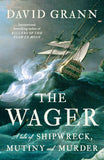Your cart is currently empty.
Gabi's Review
The true and utterly spellbinding story of the ship wreck of the Man of War The Wager in 1742, part of an expedition to capture a Spanish Galleon. David Grann has a distinctive ability to weave a gripping narrative from historical documents. In the case of the Wager he has drawn on the diaries and accounts of the mutineer Bulkeley and those of the Wager's Captain Cheap.
The ship ran into rocks off Patagonia and survivors sought refuge on a desolate and inhospitable island now know as Wager Island. Beleaguered by scurvy and starvation it is a testimony to resilience, ingenuity and adherence to codes of naval governance. Under conditions of such privation it is no surprise that divisions of opinion resulted in a mutiny. Salvaging what they could from the wreck they managed to eke out an insane existence and both Captain and Mutineers rebuilt vessels from the wreckage for their eventual escape and giving of account in a court-martial inquiry on home soil.
More epic and horrifying than Lord of the Flies the book is studded with historical gems, among them their encounters with indigenous seafaring peoples. Lord Byron's grandfather was aboard the vessel and some of his accounts inspire Byron's poem Don Juan. For anyone who likes their history realized in technicolor graphic detail from start to exhilarating finish I can thoroughly recommend this larger than life adventure.
Lindsay's Review
“The Wager” by David Grann
This is a romping tale of adventure and daring-do on the high seas. This historical account reads like a novel, as Grann’s meticulous research into the shipwreck of the warship the Wager on the Patagonian coast brings to life the bravery of the crew, their trials and tribulations, and endless torments in their quest to return to England. Bound together by British naval law, the dire circumstances forces a mutiny, which splits the group into those that return through the dreaded Magellan’s Straight, or those that wish to continue their original mission despite such losses.
Readers that like Patrick O’Brien’s naval history novels will appreciate this book, and in fact O’Briens first novel “The Unknown Shore” was inspired by the story of The Wager. Using published accounts by the survivors, private logs, and subsequent research including, Lord Byron’s grandfather, the twisted tale of British courage, naval indifference and the calamity of the 18th century War of Jenkin’s Ear against the Spanish vividly brings an era to life, in a way which makes one very happy to be safely ensconced on ones couch.
The rich and deep telling of a little understood portion of European and New World history, through the British seaman’s point of view, explores the difficulties and terrors of life at sea as much as the terrors of naval servitude, and the notions of civility and honour that drove the expansion of the British Empire. The Wager is the finest rip-roaring historical tale of adventure I have read in a long time and makes true the saying that, “fact is stranger than fiction”.
Reviewed by Lindsay
Publishers Reviews
On 28th January 1742, a ramshackle vessel of patched-together wood and cloth washed up on the coast of Brazil. Inside were thirty emaciated men, barely alive, and they had an extraordinary tale to tell. They were survivors of His Majesty’s ship The Wager, a British vessel that had left England in 1740 on a secret mission during an imperial war with Spain. While chasing a Spanish treasure-filled galleon, The Wager was wrecked on a desolate island off the coast of Patagonia. The crew, marooned for months and facing starvation, built the flimsy craft and sailed for more than a hundred days, traversing 2,500 miles of storm-wracked seas. They were greeted as heroes.
Then, six months later, another, even more decrepit, craft landed on the coast of Chile. This boat contained just three castaways and they had a very different story to tell. The thirty sailors who landed in Brazil were not heroes – they were mutineers. The first group responded with counter-charges of their own, of a tyrannical and murderous captain and his henchmen. While stranded on the island the crew had fallen into anarchy, with warring factions fighting for dominion over the barren wilderness. As accusations of treachery and murder flew, the Admiralty convened a court martial to determine who was telling the truth. The stakes were life-and-death—for whomever the court found guilty could hang.

